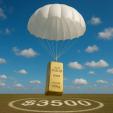The Markets have A Sense of Humour
In this article, an attempt is made to point the way to making some "sensible" investment profits, with as low a risk as possible. Unfortunately, it is necessary to be a bit theoretical up front so as to get everyone on the same page.
There are those people who believe that share prices are a function of underlying values, and there are those who believe that "value" is an issue of perception, which changes depending on currently prevailing circumstances. By way of illustration: what is the value of an ounce of gold to a man dying of thirst in the desert?
The truth is that both views are correct in relative terms, but the pendulum swings from optimism to pessimism depending on the prevailing "mood" of the investing public. Both Fundamental Analysis and Technical analysis have their places in investment decisions.
Every once in a while, tried and tested tools of investment break down. What worked in a bull market no longer works in a bear market and vice versa. It is precisely when the mood starts to change that a deeper understanding of social behaviour becomes critically important. Some - the protagonists of the theories developed by W.H Gann R.N. Elliott and Nikolai Kondrat'eff - will argue that mood swings are predictable as to timing. Others will argue that mood swings can be avoided altogether because they are manageable by the application of external forces. In essence, this view is the underlying justification by "The Establishment" of the need for Central Banks.
There is another more pragmatic camp which argues that it is a waste of energy attempting to forecast what will happen in advance, or even to attempt to manage it. To a member of this camp, it is sufficient unto itself merely to recognise (as early and as reliably as possible) when the mood has actually started to swing. Members of this camp recognise that there is a phenomenon called a "Primary" market direction, and they devote most of their energies to determining when this Primary trend has changed; and they will attempt to "ride the trend" until it has demonstrably changed. One methodology that has been well proven with this objective in mind is called "Dow Theory", which is predicated on two underlying concepts:
- There needs to be "confirmation", evidenced by a synchronicity in direction of the equity market as a whole and its key sub-components originally (and still to this day, according to some) the Transport sector
- There needs to be a further "confirmation" of underlying values.
If all the key market indices are "in sync" as to direction, and this synchronised direction is validated or confirmed by underlying values (or lack thereof), then it can be confidently argued that the market has changed its Primary direction.
One problem with any "mechanical" system is that it is prone to be self fulfilling, and so an argument could be put forward that if too many analysts are relying on the same prognosis tools, the prognosis may turn out to be false because of the added impact of the combined behaviour of the practitioners. It is for this reason that the world's foremost practitioner of Dow Theory, Mr Richard Russell, developed his own proprietary indicator called the "Primary Trend Indicator", and it is also for this reason that he has never published (in one place and at one time) the components of this indicator. If only one person knows the "secret formula" then it cannot, by definition, become self-fulfilling through over-use.
As an aside, the need for confirmation by the "Transports" was subsequently validated by a man totally divorced from Dow Theory; by the name of Cesare Marchetti. (I have referred previously to his inspired work). Marchetti proved beyond all reasonable doubt (to my way of thinking) that the World Economy is driven by newly emerging technologies - primarily Transport related - which, in turn, were predicated on newly emerging energy sources.
It is for this reason that there is not a shadow of doubt in my mind that Fuel Cell powered transportation is going to "drive" the next Kondrat'eff upwave. However, I do have some hope that this Primary Bear market may not turn out to be as serious as some are arguing. The "Primary Issue" will revolve around the quality of our Society's Leadership (which may or may not include our Political Leaders).
Further explanation is necessary.
From where I sit, Richard Russell has been spot on. He correctly called the mood swing from Primary Bull to Primary Bear, and I salute him for that. However, there is some doubt in my mind as to precisely where we are in the Kondrat'eff cycle. There is a possibility that we may be closer to the "economic" bottom than many think - ie There is a possibility (admittedly very slight) that, this time around, the economy may have been leading the market; and that the market has been behaving out of synchronicity with the economy because the Central Bank has been priming the money pumps, and in the process has created a smokescreen of obfuscation.
The leading technical analysts in their field today, seem to me to be as follows:
- Dow Theory - Richard Russell
- Kondrat'eff - Harry Schultz (although he seems to keep a low profile on his level of understanding), and others
- Elliott Wave - Robert Beckman, Robert Prechter
- On Balance Volume - Joe Granville
- Gold - The Aden Sisters, Dr Clive Roffey, Bill Murphy, and others
I am not sure where Joe Granville stands at present, but I suspect that all the other leading experts are hugely bearish on the stock markets and bullish on gold.
When there is "unanimity" of view in any segment of the community - even amongst the people who are behind the 65 million or so "hits" to this particular Gold-Eagle site, I start to hear faint warning bells given my understanding that for all His genius, our Creator has a flaw in His make-up. He has a sense of humour. Whilst the world may "appear" to be created to the level of precision of a Swiss Watch, those of us who have a sense of humour readily embrace the possibility that that which is "brown and sticky" may really turn out to be just "a stick".
It may therefore surprise some serious professionals who earn their living off the markets, to hear that "the Markets" also have a sense of humour, and it is too simplistic, indeed facile, to talk about "Contrary Thinking". Life is not that simple that we should be able to prosper by doing just the opposite of what the majority of people are doing.
At moments like these I look around for "off the wall" arguments that could be used to refute the commonly agreed perceptions (albeit in subsections of the community).
At moments like these, I try to imagine that if I was a living being known as "The Market", and I had a wicked sense of humour, what would I do? What would I do to ensure that as few people as possible are able to make an "easy" buck? What would I do to demonstrate how foolish it is to embrace the concept that it is better to leech off the efforts of others than to earn a living from your own "value add" efforts.
(This is not a judgmental statement, dear readers. Remember, I am merely trying to imagine what a Mephistophelian Market could be thinking)
Well, here's what I would do to create the maximum havoc amongst all the lazy bums who think that they can outsmart me. I would:
- Cause interest rates to spike upwards so as to wipe out as much capital profit in the Bond Markets as possible.
- Cause the Gold Price to "tank" so that all the "gurus" in the markets got egg on their faces; and I would clap my hands in gleeful merriment as the share prices in all those marginal gold mines took a swan dive off a cliff as they adjusted to the reality that a marginal mine is really just a marginal mine - and anyway, most of them are located in a country where there is a huge sovereign risk.
- Cause a vicious (temporary) upward spike in share prices so that I could wipe out as many short sellers as possible.
- Finally, having caused as much financial havoc as I could, I would then resume my merry way along the path towards allowing the Primary Bear market to unfold - whilst at the same time leaving interest rates at a structurally higher level.
So, shifting from my right brain back to my left brain, I have to ask the question:
Can I envisage a "real" scenario where interest rates could spike over the medium term, the gold price could fall over the short to medium term, and equity prices could spike upwards, settle back down again, and essentially go nowhere over the next decade or so?
Duuhh! Yup. Yup. I guess I can
Interest rates: Bear in mind that rates charged by the commercial banks to their clients are dictated by TWO factors: One is the price THE COMMERCIAL BANKS pay for money, and the other is the level of overheads THEY need to cover. If a bank cuts its infrastructure to the bone and still finds itself unable to cover its costs then it will go out of business unless it raises its profit margin - ie charges more for the capital it lends out. I can seriously envisage a scenario given the level of debt (and the implied level of coming bad debts) that the entire banking industry is going to have to raise its gross margin - which is the spread between what they borrow at and what they lend at. Under such a scenario, the Federal ad State Governments will not attract loan capital THEY need unless they raise the price THEY are prepared to pay for loan funds. It therefore seems likely that the spread between Bond rates and Treasury rates is likely to rise, and bond yields could very well spike upwards even in a stagnating economy.
Gold Price: There is no doubt in the mind of any thinking person that the days of fiat money backed by nothing more than the empty promise of misguided (crooked?) politicians are coming to an end. But the reality is that life is not "black" or "white". There are shades of grey, and only an intellectual hunchback will embrace the concept that the world can "suddenly" switch from a fiat currency standard to a gold standard without SERIOUS dislocation occurring. It is totally counterproductive to think in terms of extremes because if we do have SERIOUS dislocation, then we are likely also to have shortages of critical necessities flowing from a disruption in commercial trade. For example, if oil suddenly stopped flowing into the USA, the country would experience serious dislocation. When cool heads prevail, it will become generally understood that the world will be best served by a slowly (but steadily) rising gold price as the world moves slowly (but steadily) towards a more sensible currency system.
Investment in Gold and selected gold shares should therefore be regarded as a short term "insurance policy" against a financial dislocation, and a long term hedge against capital erosion.
"Churning" stock market: If we proceed from the base assumption that Alan Greenspan is not a schmuck, and that he must have had a smidgeon of capability to get his current job in the first place, then maybe we can also credit him with having understood that the economy has been shooting through some particularly dangerous "white water" in the past few years. If this self confessed gold bug actually knew what he was doing, and he deliberately created a financial bubble because he wanted to ensure that the deflating economic bubble would not "burst", then it may eventually turn out that the economic bubble may already be nearing its point of maximum deflation, and what we now "may" be able to engineer an expanding economy which will offset a deflating financial market.
Let's also proceed from the base assumption that George W Bush is not the "real" leader of the USA, and that there are some far brighter minds than his and far surer hands than his at the helm of the Economic and Social ship. Let's also proceed from the base assumption that the "threat" of war is far more potent than the "reality" of war because it forces the recalcitrant Nations to seriously contemplate their navels about the consequences of playing outside mainstream Humanity's ballgame. Under these circumstances - provided war can actually be avoided - perhaps there is a possibility that we can engineer a greater level of co-operation amongst the Nations of this planet who have been posturing like demented clowns for so many years in the debating chambers of the United Nations.
Maybe we have already reached a point in Human history where we have grown up sufficiently to start co-operating with one another in our common interests.
So, moralising aside, if the above reasoning is even remotely close to explaining what is really happening in the background, how do we make a buck out of our investments?
Here are a few basic rules of engagement:
- One: Buy low, and sell high
- Two: Don't gamble your capital
- Three: Try to grow you nest egg through compounding income rather than rely solely on capital growth.
What investments are low that we can buy?
Bingo!! Gold and Silver are "Dirt Cheap" for no other reason than that the current price is lower than the cost of production of many mines across the industry. For the industry to survive, prices must rise.
Personally, I prefer Silver because it is both a "Poor man's" currency and an extremely versatile raw material. (Water disinfection, electronics, superconductivity, mirrors, photography and, incidentally, jewellery). I also prefer Silver because it appears that above ground stocks of Silver have been exhausted, and few mines can produce Silver profitably at current prices. Ergo - the pricing structure of Silver must adjust (sooner or later) on an industry wide basis. Finally, Warren Buffet is no schmuck either. He bought 130 million ounces and that involved committing some serious capital. Of course there is always the possibility that the current downward spike in Silver has been caused by his exiting at distressed prices, but this would be out of character. My guess is that what we are seeing is a temporary market aberration possibly caused by traders trying to flush out volume by "stuffing" the price on low volume sales, but I have no evidence to support this guess.
Silver Standard Resources (SSRI) seems to me to be a good investment at its current price when looked at under the "buy low, sell high" rule. The others PAAS, SIL and one or two others also seem reasonable but I have not devoted much time to detailed analysis. I am personally invested in a little silver mine called Macmin Silver.
On the other hand, Gold is also an essential part of any investment portfolio and if the gold price "tanks" over the next couple of months, then companies like Newmont and Barrick, and Anglo might be able to unwind their forward positions. I am not particularly happy with any of these three because Newmont is overpriced at the current gold price, Barrick is over hedged, and Anglo controls mines that are mainly South African. Nevertheless, I have settled on Newmont because it is the "least risky" of the "Institutionally Acceptable" investments and is also likely to survive over time. However, none of these three qualifies under the "buy low sell high" rule and should be bought only as a leveraged insurance policy.
Don't gamble your capital: Any investment that is highly priced has a high accompanying risk that you will lose some/all of your capital. What is highly price? Relative to what? Historically? Why is this relevant? Price is determined by people's perceptions of value and by the balance of supply and demand. Right now, Bonds appear to be overpriced because of "valuation issues" Why should I risk my capital to get a 4% yield if there is a possibility that yields could spike? If yields spiked to (say) 6%, I could lose 33% of my capital. By the same reasoning, why should I risk my capital on Common Stock equities if it is going to take 30 years to get my money back at current earnings? In any event, in the current economic environment, who is to say that earnings won't go South before they go North - especially if interest rates spike upwards?
Why should I risk my capital in real estate if there are signs that the building industry has peaked? Golden rule. When in doubt, stay out. If you can't find anything sensible, then short dated Treasuries seem like a good place for a US citizen to park his capital.
Compounding income: There are very few places today where one can get income. Some of the more gutsy amongst us would do very well to look at the smaller end of town. Small businesses can typically be bought at very low multiples. The problem is that these need to be actively supervised or you will breach rule 2 above. Another problem is that you can't put large licks of capital into small businesses.
So the short answer seems to be:
- Silver appears to offer the best investment opportunity around from a "cost of entry" perspective, whilst gold is a mandatory insurance policy.
- From the perspective of safety, short dated Treasuries seem to offer the most sensible place to park your money (provided you don't assume sovereign risk on cross border investment)
- A shortage of income yielding investments is likely to cause some people to have to live off capital for a while - except for "vulture capitalists", who manage to buy income generating assets from over-extended borrowers who are forced to sell under distress circumstances.
How long is "a while"?
Well, that depends on how close we are to the bottom of the Kondrat'eff wave. My WAG (wild assed guess) is anything up to four years before income generating investments once again start to make sense. Alternatively, if bond yields spike in the next couple of years it will probably be safe to get back into bonds. In the meantime, get to know your family again.

















